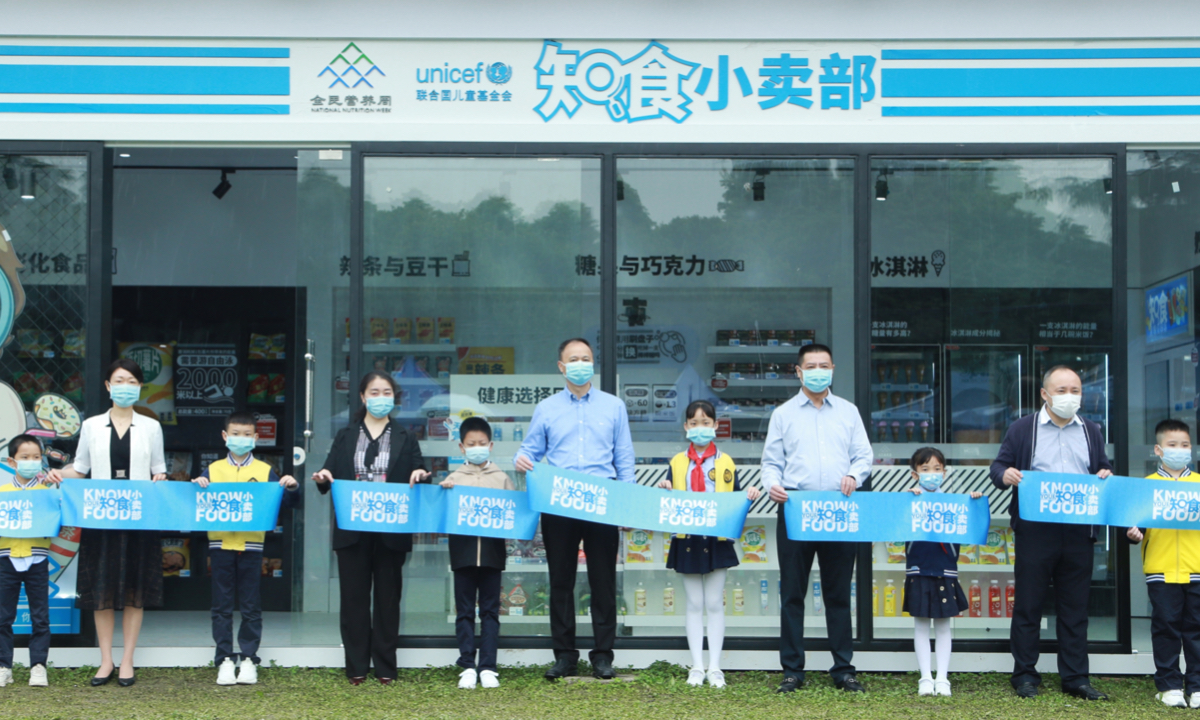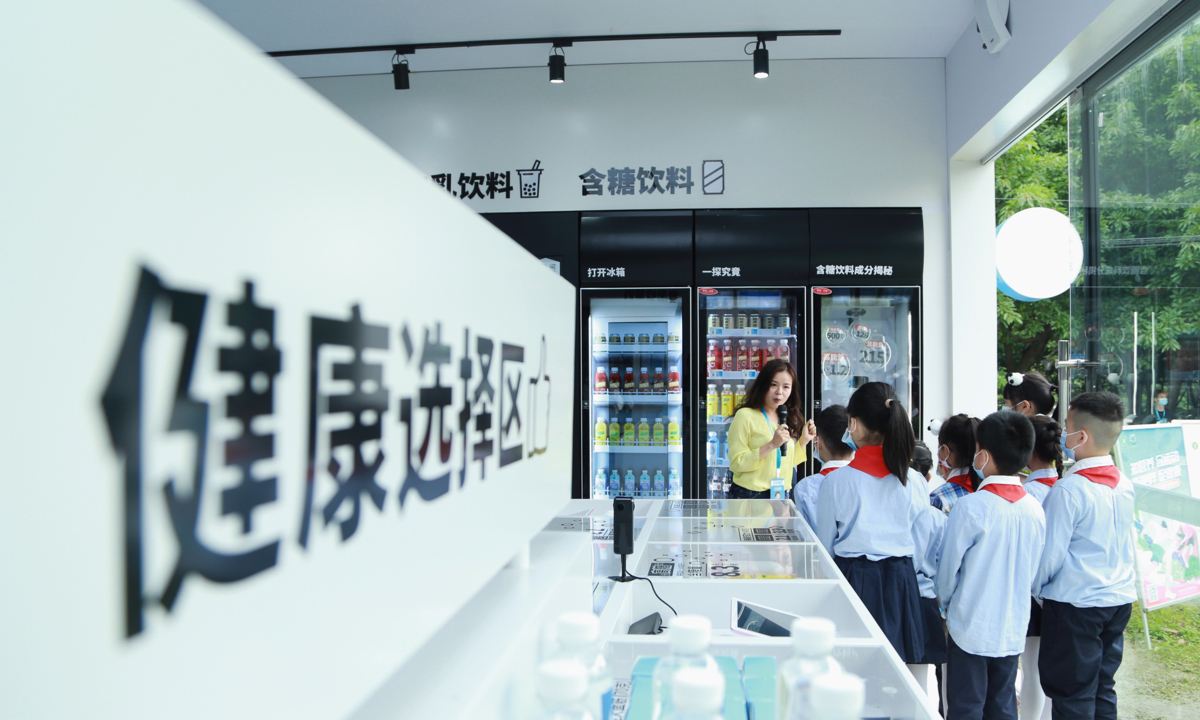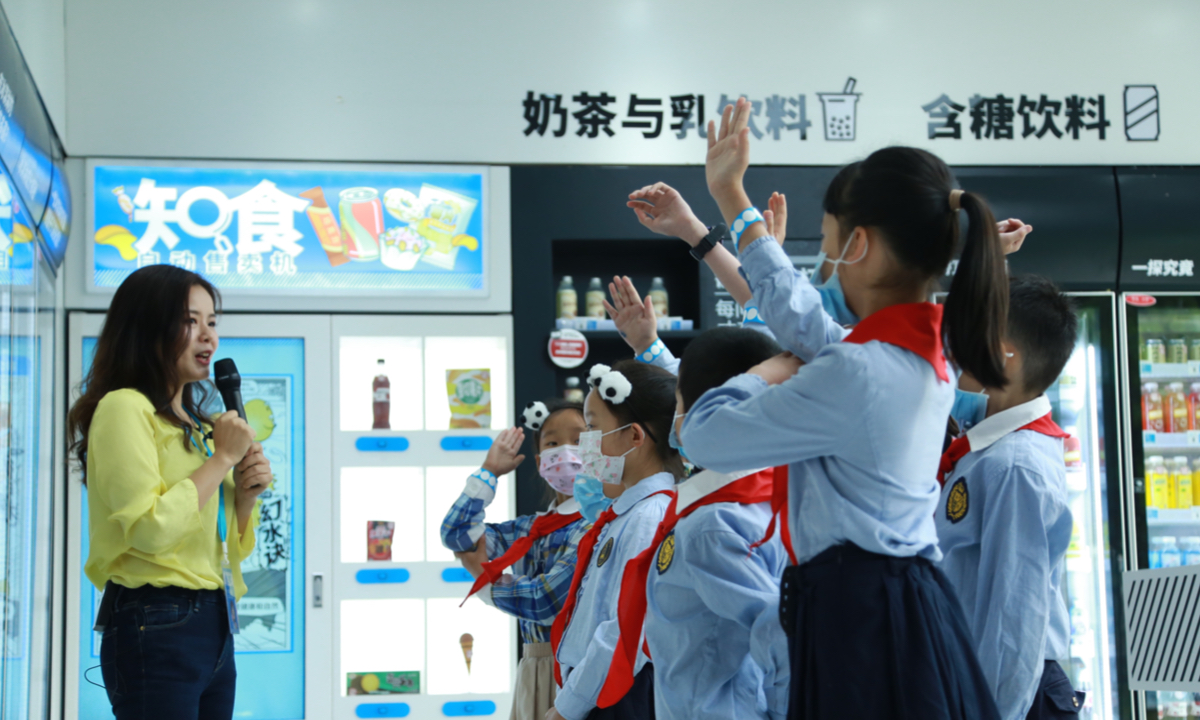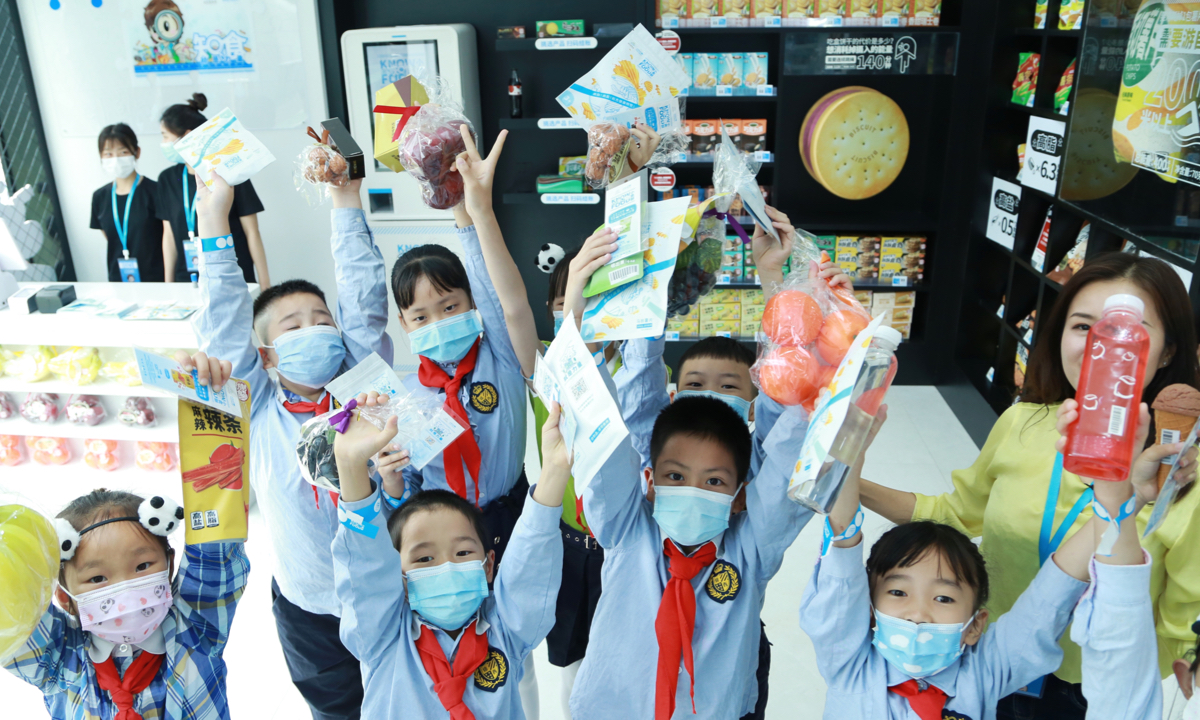UNICEF unveils a mock convenience store to bring attention to children’s food environments, as part of a ‘Know Your Food’ campaign
The campaign empowers children and young people to make informed, healthy food choices amid rising overweight and obesity in China

Children and government representatives from Chengdu cut the ribbon for UNICEF’s ‘Know Your Food’ Convenience Store at the Chengdu Children and Youth Activity Centre, Sichuan Province, on 17 May 2022. UNICEF unveiled the ‘Know Your Food’ Convenience Store with a twist to highlight the content of sugar, fat and salt in popular pre-packaged foods, which contributes to an unhealthy food environment for children. The store is the centerpiece of UNICEF’s ‘Know Your Food’ campaign, launched to empower children and young people to make informed, healthy choices about their diet through improved nutrition literacy. @UNICEF/China/2022/Ma Ding

Children visit UNICEF’s ‘Know Your Food’ Convenience Store at the Chengdu Children and Youth Activity Centre, Sichuan Province, on 17 May 2022. UNICEF unveiled the ‘Know Your Food’ Convenience Store with a twist to highlight the content of sugar, fat and salt in popular pre-packaged foods, which contributes to an unhealthy food environment for children. The store is the centerpiece of UNICEF’s ‘Know Your Food’ campaign, launched to empower children and young people to make informed, healthy choices about their diet through improved nutrition literacy. @UNICEF/China/2022/Ma Ding

Children visit UNICEF’s ‘Know Your Food’ Convenience Store at the Chengdu Children and Youth Activity Centre, Sichuan Province, on 17 May 2022. UNICEF unveiled the ‘Know Your Food’ Convenience Store with a twist to highlight the content of sugar, fat and salt in popular pre-packaged foods, which contributes to an unhealthy food environment for children. The store is the centerpiece of UNICEF’s ‘Know Your Food’ campaign, launched to empower children and young people to make informed, healthy choices about their diet through improved nutrition literacy. @UNICEF/China/2022/Ma Ding

Children take a group photo at the end of their visit to UNICEF’s ‘Know Your Food’ Convenience Store at the Chengdu Children and Youth Activity Centre, Sichuan Province, on 17 May 2022. UNICEF unveiled the ‘Know Your Food’ Convenience Store with a twist to highlight the content of sugar, fat and salt in popular pre-packaged foods, which contributes to an unhealthy food environment for children. The store is the centerpiece of UNICEF’s ‘Know Your Food’ campaign, launched to empower children and young people to make informed, healthy choices about their diet through improved nutrition literacy. @UNICEF/China/2022/Ma Ding
The ‘Know Your Food’ Convenience Store, on display at the Chengdu Children and Youth Activity Centre, Sichuan Province, was created to coincide with National Nutrition Week, which falls in the third week of May. The store is the centerpiece of UNICEF’s ‘Know Your Food’ campaign, launched today to empower children and young people to make informed, healthy choices about their diet through improved nutrition literacy.
China faces a rising burden of child overweight and obesity. It is estimated that 15 million Chinese children are obese . The prevalence of overweight and obesity among children aged 6-17 years old reached 19 per cent in 2020 . Overweight and obesity have adverse consequences throughout life, with higher risks of non-communicable diseases, higher risks of emotional and behavioural problems, and economic impacts on individuals, families, and society.
“A changing environment characterized by increased availability of cheap, highly processed foods and beverages together with aggressive marketing of these products to children can contribute to the rapid growth of overweight and obesity in children,” said Cynthia McCaffrey, UNICEF Representative to China. “This in turn undermines their right to adequate nutrition and health,” she added. “UNICEF created this mock store to simulate the food environment that our children are exposed to every day. By visualizing and presenting information about the high levels of fat, sugar, and salt that we know are unhealthy, we want children and their parents to understand the nutrition values of popular snacks and beverages, so they can make more informed choices.”
Like a regular store, the ‘Know Your Food’ Convenience Store is filled with dozens of puff foods, candies, sugar-sweetened beverages and other common snacks. However, the tags on the items don’t show prices; instead they display whether they are high in fat, sugar and salt, and the items’ total energy content. Through interactions and displays, children and their caregivers can understand the connection between frequent consumption of these highly processed foods, and the risk of overweight and poor health outcomes. The store also provides information on how they might make healthier food selections.
At the launch of the store, Jia Yong, Deputy Director of the Chengdu Municipal Health Commission, expressed his gratitude to UNICEF for providing the store to the city, and invited children and parents across the city to visit it in person or online. “Let’s transform our knowledge about food nutrition into power and health,” Jia said.
In addition to Chengdu, Weihai in Shandong Province and Enshi in Hubei Province will also inaugurate the ‘Know Your Food’ Convenience Store at the Weihai Science and Technology Museum and the Enshi Experimental Primary School respectively on 20 May, Student Nutrition Day. The installations will be permanently kept by the three cities. There is also a virtual store available on Weibo, Kwai and WeChat.
With support from the China Athletics Association, Chinese athletes Liu Shiying (a javelin thrower), Zhu Yaming (a triple jumper), Li Zhixuan (a marathon runner), Ge Manqi (a sprinter) and Wang Yu (a high jumper who won gold in the 2018 Asian Games in Jakarta) helped amplify the messages of the campaign and shared with children and young people the importance of nutrition literacy to health.
In collaboration with short video platform Kwai, the ‘Know Your Food’ campaign will also feature interactive experiments to create an immersive learning experience for children so that they can understand the science behind food. Dr. David Evans, a chemistry professor from the Beijing University of Chemical Technology and video blogger on Kwai, joined UNICEF to produce science experiment videos to explore the ingredients of some of the most popular snacks and sugar-sweetened drinks.
Weibo Open Classes, Weibo Pan Knowledge, Weibo Gongyi, and Sina Gongyi also supported the #KnowYourFood digital campaign by inviting many influencers to amplify nutrition knowledge and promote the virtual store. A knowledge quiz and open discussions on the subject will be available to the public.
To further expand the reach of the campaign, and to encourage children to make changes, UNICEF has worked with nutrition and education experts to develop teaching materials to promote healthy diets for primary and secondary school students. The “nutrition sessions” will be offered to students, parents and caregivers, so that students and their families can take action to improve students’ diets and nutrition. The educational resources are expected to reach 1,000-2,000 schools across the country, including those in Beijing, Chengdu, Enshi and Weihai.
To echo UNICEF’s call to switch from the consumption of sugar-sweetened beverages to clean water, the city of Weihai has joined a ‘Zero Sugar Sweetened Beverage Month on Campus’ initiative. All primary and secondary schools in the city are asked to stop selling sugar-sweetened beverages on campus from 15 May to 14 June. Students are encouraged to drink water, a healthier choice.
Improving nutrition literacy is a first step in the prevention of child overweight and obesity. UNICEF is also working with government partners to strengthen policies, implementation plans and regulatory frameworks and strategies that safeguard children from the influence of unhealthy food marketing.
“Governments, food companies and marketers, communities and schools have a collective responsibility to put children’s needs first, and guarantee children’s rights to nutritious food and healthy futures. We must work together to reshape food environments and reverse the trend in childhood overweight and obesity before it is too late,” said McCaffrey.
